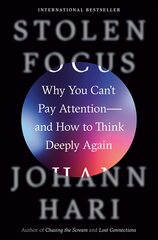 If you've ever had trouble maintaining your focus then I recommend picking up a copy of Johann Hari's book, Stolen Focus: Why You Can't Pay Attention - and How to Think Deeply Again (2022). You could also listen to Hari's interview with Dr. Rangan Chattergee on his podcast, Feel Better Live More (my favorite podcast series). Two quick tips for gaining more focus right now:
Focus Needstime for play ability to enter into a state of flow ability to engage in sustained reading meaningful activity time for mind wandering quality deep sleep nutritious food daily movement feeling a sense of safety Focus Needs Protection Fromtoo much speed
too much switching multiple stimuli addictive/intrusive technology stress exhaustion processed food polluted air
0 Comments
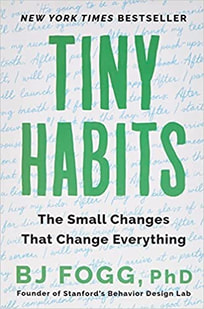 For the past eight weeks I have been immersed in reading, thinking, and acting upon BJ Fogg's work in helping people to develop new habits. Personally, I am working to develop a daily habit of writing.
The beauty of this approach is that by making tiny changes you really can influence your behavior. For instance, I aspire to keep a tidy house, yet when I eat a snack in front of the TV I (used to) forget to take my dishes to the kitchen. This approach has helped me to change that. PROCESS
If you are interested in developing new habits in your life you can learn more at this website: https://tinyhabits.com I have used the five-day free coaching program and can attest to the fact that it works. If you have an hour and want to take a deep dive into this process I recommend you watch this podcast conversation between BJ Fogg and my new favorite inspiration, Dr. Rangan Chatterjee: https://drchatterjee.com/bj-fogg-the-secret-to-making-new-habits-stick/ 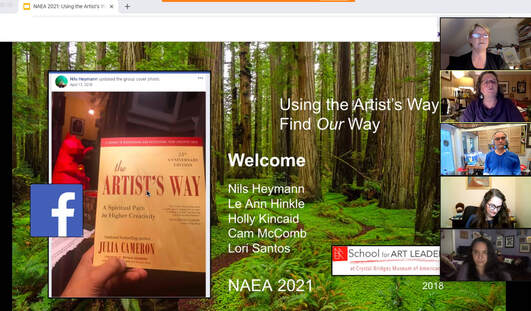 On Saturday I had the pleasure of presenting alongside four colleagues in art education. For the past year we have been supporting one another in completing tasks outlined in Julia Cameron's book, the Artist’s Way. We reflected upon our practice of writing morning pages, going on artist dates, and making time for intentional walking. We were so inspired by our collective energy that we decided to continue. This time we are going to read/listen to Julia Cameron's book, Walking in This World. The precepts are the same, with a focus on walking. I look forward to seeing where this journey leads. 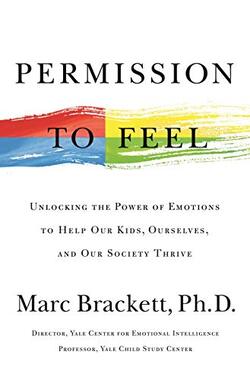 Today I listened to a Podcast conversation between scholars Brene Brown and Marc Brackett. The topic - The Permission to Feel. This conversation and Brackett's book are essential reading/listening for those in education. The quick version can be remembered by the acronym RULER: Recognizing emotion that comes to us, Understanding the emotion, Labeling the emotion, Expressing the emotion, and Regulating the emotion. These ideas hit home for me because I thought I was feeling numb to the current COVID-19 crisis. The idea of feeling numb was paralyzing my response to the world. Now I realize that I am fully aware of how I am feeling and that I am self-regulating those emotions. If we want to raise children to be effective compassionate leaders, then we need to teach them to recognize and honor the feelings they experience in life. Visual art is the perfect vehicle for helping people to express their emotions as part of the larger process of understanding themselves. 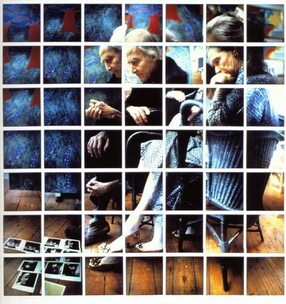 You are going to be telling this story for years to come. Like the people we hear on NPR talking about their experiences with Influenza, Polio, N1H1, Ebola, and now, COVID-19.... people will ask you to tell them all about the great virus of 2020. You will tell them what you remember, but if you act now you can also show them what you experienced. Others will have taken photos of empty shelves, makeshift hospitals, long lines at the testing centers, and even mass funerals. But what about YOUR experience? What did you have to do first to prepare? How are you feeling about what is happening? Take time now to write down what you are experiencing, especially since the conditions of what we are experiencing are changing daily. In these early stages, what resistance to change are you having to face? How are you giving and receiving compassion to/from others? Draw pictures, make doodles, use graphic organizers to group your thoughts into categories. You could also make your thoughts public by starting a blog or website. In addition to having a record of how you survived this moment you will also improve your mental outlook by moving all of those thoughts from your mind and onto the page. -Art work pictured above was created by artist David Hockney. 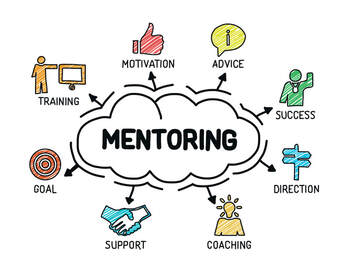 I was chatting with a colleague earlier this month and expressed disappointment in having a conference proposal rejected. To my credit, there were 15,000 proposals submitted so the likelihood of getting accepted on my first try was slim. But still... Who enjoys being rejected? My colleague carefully listened and then, rather than walking off and wishing me well... he offered to listen to my writing and research interests. We immediately set a date and time for him to begin mentoring me. This generous offer touched my heart and immediately prompted me to engage in several hours of organization and prioritizing. It felt good to have someone at my workplace show interest in my scholarly development and in promoting my scholarly success. You know... in education we work hard to help the novice, but how do we help those of us with 30+ years of experience? If we want to promote lifelong learning then it makes sense that learners need guidance, support, and mentorship at multiple points along the educational career path. This experience has me wondering: How can leaders in education better work to mentor mid and late career professionals? I don't have the answer, but the question surely seems worth pursuing. 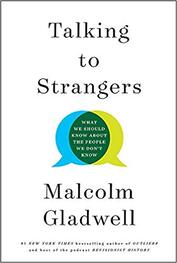 I recently listened to Malcolm Gladwell's audio book, Talking to Strangers thinking that he would give me strategies for improving this skill. Instead, Gladwell gives the reader/listener insight into why we humans get it all wrong when talking to strangers. His work has serious implications for teachers. Default to Truth: It's easy to say that we will treat all students with dignity and respect, yet when faced with a challenge Gladwell argues that we default to our perception of the truth. If this is so, then teachers need to take a hard look at their perceptions of children. If they think a child cannot perform based upon race, socio-economic status, or gender, then eventually this perceived "truth" will surface. People's actions and words speak for themselves, right? Gladwell calls this impulse transparency claiming that we believe that the actions and speech of others is transparent to us. This is not the case. Picture the teen who sits back in their chair, legs stretched out, hood pulled up over their head. It's easy to assume that this student is disinterested or disengaged from learning. In actuality, we don't have any idea what this teen is thinking. By assuming the teen to be disengaged it would then be easy for a teacher to default to truth and begin treating the teen in a hostile or confrontational manner. I encourage teachers to check, and if needed, reset their default beliefs about children. Here are two truths I was taught as a young teacher that have served me well:
Each summer I take time to travel back to my birthplace to reconnect with my roots. While I appreciate the edginess and relevance of most contemporary art, I find myself most soothed and inspired by landscape painting. I’m pretty sure it’s because my DNA is connected to landscapes such as this one photographed while on the scenic highway in Pocahontas County, WV. These trips remind me that while we may educate to expand students’ appreciation and knowledge in the arts, that what brings each individual meaning is going to widely differ.
I look forward to the start of a new semester and hope that all of my art education students and colleagues have an enjoyable, inspiring, and professionally productive school year. May you each find meaning in the work accomplished together. Summer is the perfect time to sit outside enjoying the sounds of nature while also reading a good book. This week I finished reading Schools on Trial by Nikhil Goyal (2016). The title is a bit misleading suggesting that the author is going to make recommendations on how to improve education. Instead Goyal makes a strong case for why we in education need to stop privileging the wealthy and make innovative educational approaches accessible to all learners, particularly the poor. Claiming that "non-creative behavior is learned" (p. 115) Goyal presents anecdotal evidence to support seeing teaching and learning through a more liberating and democratic lens. Readers focused on education reform will be reminded of the history of compulsory education and will be introduced to school-wide initiatives worthy of 21st Century consideration.
|
WelcomeLiving as an artist/researcher/teacher affords me the opportunity to work with creative artists, scholars, and teachers residing in the state of Michigan, the United States, and throughout the world. This site is dedicated to cultivating the energies created through these contacts and collaborations. Archives
August 2022
Categories |


 RSS Feed
RSS Feed